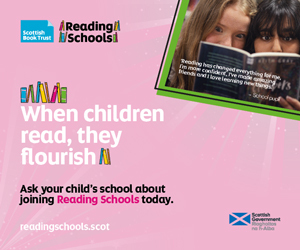Primary Times - the definitive what’s on and where to go family guide of activities and events for children of primary school age. Things to do with your kids during the school holidays including arts and craft activities, music and theatre for children, parties, competitions, days out, and family attractions along with term time drama schools, dance classes, after school clubs and sports activities. Things to do at a place near you!
Tips to get your child reading this winter
 By Judy Vickers
By Judy Vickers
I WAS in a charity shop the other day and spotted an old copy of Mary Stewart’s The Little Broomstick, the front cover the same as I remember when I was a child. That image of Mary and magic cat Tib transported me back to being perched on my bedroom windowsill, the curtain closed so the world was shut out, a book in my hand and my head in another world of fairies or Famous Five adventures, or anywhere except my rather ordinary school-and-homework life.
Fast forward a few decades, and I have my own children. And they do read. But nowhere near as much as I did. The array of screen-based chill-out options, from on-tap movies to Minecraft, means curling up on the sofa with a book is way down on their list of choices for a chilly dark winter evening.
And it’s a problem constantly echoed by parents and experts; children’s reading for pleasure is in decline. So how can you convince a reluctant or non-existent reader that books can be fun? Or make sure a keen five-year-old will still be that way at 12?
Let them see you read
Monkey see, monkey do. It’s why pre-schoolers love toy vacuum cleaners. What you do, what you present as normal, has a huge subliminal impact.
“It can be very powerful for children to see the adults in their lives as readers,” says Marc Lambert, CEO of Scottish Book Trust. “Let them see you reading a wide variety of texts – whatever you’re keen on: graphic novels, non-fiction, autobiography, magazines.”
Try stuffing a book into your bag or leaving one in the car so it’s always to hand. Then any time you normally pick up your phone to check messages – waiting at the dentist or doctor, at the side of the swimming lesson or football class - you can pick up the book instead.
Let children choose their own books
I hate Horrid Henry. And that series of Frank Lampard’s football books, though not quite as much as Katie Price’s pony ones. But, according to Edinburgh-based best-selling children’s writer Lari Don, author of the Fabled Beasts series, trying to direct your children towards what you see as “worthy” books is completely counterproductive.
“Never make a child feel bad for choosing a book that you think is ‘too young’ or ‘too frivolous’ – developing a reading for pleasure habit is much more important than the content of any particular book,” she says. “And never force a child to finish reading a book they are not enjoying.”
Start a conversation
Chat to them about the books they are reading. “But not in a testing knowledge sort of way, more in a conversational sharing opinions sort of way,” says Lari Don. “Speculate about what characters do next or what favourite characters would do in particular situations.”
And tell them about what you’re reading too. “Talk to the children about your reading life, including what you are currently reading and invite them to do the same,” says Marc Lambert.
Let them know, too, that reading isn’t always plain sailing, even for adults. “Sometimes we have to read and re-read before we understand something; sometimes we don’t finish books; and sometimes we don’t know what to read next. Talk to them about the challenges you experience as a reader and how you get around them,” says Marc.
Don’t ditch the bedtime story
Cuddling up with them when they’re tiny and reading them a bedtime story is adorable. But it’s easy to let that routine drift as they get older; they’re shattered after school, you’re shattered after work, and it feels like the easiest and best thing to do is shovel tea into them and get them into bed. But keeping that bedtime story routine helps them - and you - wind down, providing a golden opportunity to do some reading.
“Making time to read aloud to the children really makes a difference particularly if the book you are sharing together is part of a series: it can be a great way to get kids hooked and wanting to read more,” says Marc.
Forget books
For some children, the thought of ploughing through a 100 or so pages is just too daunting but books are not the only source of reading material. My son will read a newspaper sports section if I leave it lying about with an arresting picture on show. Old-fashioned comics or magazines can also do the trick.
“If your child is interested in films, football or computer games, look for books based on these. For example, there are novels based on the latest Star Wars films, tie-ins to TV shows and books about sporting stars,” says Marc.
Even an audio book can spark a love of a story without the effort of turning the pages – and might make reading the actual book easier. Try borrowing them from your local library to keep costs down.
Make books part of your routine
“Make reading for pleasure a normal part of the children’s day,” says Marc. Make visiting your local library a regular thing, where they’ll have a huge range to select from. “And make sure books are visible around the home, leave books on their bedside table and encourage them to pack books for going on trips or holiday,” says Marc.
For inspiration on book choices, check the Scottish Book Trust’s book lists: www.scottishbooktrust.com/reading/book-lists







